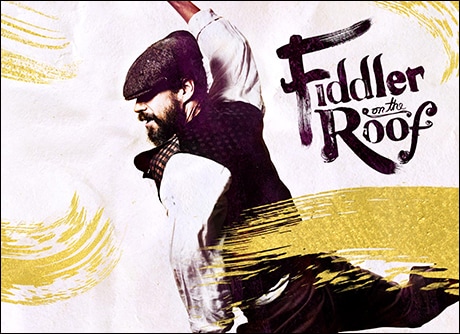 Curtains the Musical Whodunnit is a Bloated But Fun Rompby Randi / January 7, 2020
Curtains the Musical Whodunnit is a Bloated But Fun Rompby Randi / January 7, 2020It’s Theatre Thursday! Today’s show is Fairview, playing at London’s Young Vic until January 23.
I really hate when writers include spoilers in reviews, like they can’t write about the show without ruining it for everyone. I’ll do my best to avoid them here, but it’s kind of impossible to talk about the power of Fairview, the 2019 Pulitzer Prize-winning drama, without spoilers, so gird your loins/stop reading if you are going to see it. Now making its London debut, the play by Jackie Sibblies Drury ends in a way I can’t say any other theatrical work ever has. Even aside from that ending, it’s hard to talk about the play in general because it’s about that incredibly difficult thing to talk about as a white person: race and how terrible white people are. Okay that second part might not be the point, but if you are a white audience member who walks away from the show not feeling completely shitty then you maybe weren’t paying attention (like to the world either). I’ll try to not say anything ignorant, but I am a whitey, so, WE’LL SEE.
Fairview tells of a middle-class black family preparing for Grandma’s big birthday dinner: You have the mom trying to do everything perfectly, the feisty (and hilarious) aunt with the strong opinions, the husband who actually remembered to buy the root vegetables!, the daughter who is nervous about graduating high school. You have the set of a very large, plush home, very beigey-pinks and grays, very Miami in the 1980s that felt a little sitcommy at first and then, as the play progresses, a lot sitcommy. The first section of the play, as the family prepares dinner and argues and jokes with each other, is – like a sitcom – extremely pleasant, very funny, and opens a lot of doors to what kind of action could come next for the family.
And then, no further action comes. Instead of showing what happens with the big birthday dinner, or if the uncle’s plane will take off, or what the daughter will decide about college, instead the rug is pulled out from under you and the sitcommy feel is substantiated. The actors restart, and they go through the entirety of the first section blocking again, but silently. We see the movements and spills and gestures and little dances for the second time, but now the audio is the voiceover conversation of four white people watching this program, talking about the characters, talking about race. It’s a shock, and it’s awkward, interesting, and disturbing the whole time. The four viewers are the kind of people who will proclaim nicely “I’m definitely not racist!” but then in the same breath say a lot of racist things that aren’t obviously mean or cruel but are still wrong, the kind of people who, as we hear, casually converse about ‘what race you’d pick if you could change’. It is a bold gear change into a provocative flat-out conversation about race, except without a knowledgeable or culturally sensitive voice in the bunch.
And that’s the bit that’s slightly disappointing. It’s not the play’s fault but that of its marketing/other reviews, for saying that this is ‘the play that will make ‘woke’ white liberals realize their mistakes’ or whatever. As a white liberal, I was, as I am with all things purporting to show me how wrong I am, eager to learn what I’m doing wrong and try to improve. But these four white people are blatantly terrible people. They are not ‘woke’ and they are nothing like the people who would be described as or would describe themselves as being ‘woke’, at least if the people had any idea what that (annoying) word was supposed to mean. And liberal? I’m sure at least some of them would be Trump voters. They say clearly racist things and treat race like it’s a fashion choice. It’s worthwhile to show that the things they say and think and eventually do are problematic, but anyone who didn’t already know how problematic these ideas were already miiiiiiight be racist! Or living under a rock.
The third section dives even more into the surreal, with the two worlds mixing into eventual chaos, perhaps representing the kinds of conversations we try to have without better guidance, and perhaps representing the problems we face when white people ‘want to help’ but also don’t want to acknowledge, or give up, their privilege. That reluctance to give up your privilege comes to a head at the end, when the tables turn and the white audience members literally become the object of stage-lit scrutiny, and their (our) hesitance to listen to the cast’s urgings become the subject of this wider, provocative discussion on privilege, entitlement, and expectations. I can’t imagine any white person seeing this, experiencing this ending especially, and not feeling exposed, guilty, uncomfortable at the very least, so that’s good, I guess, for self-reflection. But who knows how many people who needed to feel that momentary guilt and shame took it into their actual lives? And it’s not up to me to say that that momentary guilt and shame was worth making the people of color in the audience feel even more like the objects of white gaze, under scrutiny as well.
So I was left afterwards with a kind of numbed sensation, embarrassed (in part because of stage fright). The play is the definition of provocative, leaving your mind a blur of jumbled thoughts and emotions, which can be the mark of a successful dramatic work. It’s confrontational, it’s fascinating, and you feel uncomfortable the whole time. Now, after trying to write something the least bit coherent (I failed didn’t I) I feel even more ignorant and needing to do and be better, which might after all be what Drury had in mind.





